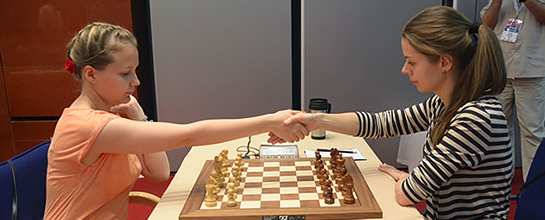The European Individual Chess Championship is a tournament in the organisation of the independent chess association the European Chess Union. This championship is held once a year since 2000. The European Individual Chess Championship does not only determine the European champions in both male and female categories, but it also provides a particular number of players who are going to play the FIDE World Cup and the knock-out of Women's World Championship.
Every year different countries organize the championship for men and different for women. The first European Individual Chess Championship for men was held in Italy, while European Individual Women's Chess Championship took place in Georgia. After that, many countries hosted the tournament such as Turkey, Germany, Macedonia, France, Poland, Bulgaria, even Kosovo.
Georgia, for instance, held three tournaments after 2000 – one in men´s competition in 2002, and others in women´s competition. However, the first competition held in Tbilisi, Georgia, was in European Individual Women's Chess Championship in May 2011.
This year European Individual Men´s Chess Championship will be held in Minsk, Belarus, while European Individual Women´s Chess Championship will be in Riga, Latvia, both tournaments are ogranized with the great support of topratedbingosites.co.uk, the official bingo partner of the events.
History of the Tournaments in Europe
This tournament was a necessity for European chess players. According to some sources, the first European competition was European Championship or Europameisterschaft was first held in Munich, in September 1942. It was established by Ehrhardt Post, who was the Chief Executive of Nazi Grossdeutscher Schachbund. Consequently, the players from the Soviet Union, Great Britain, and Poland were unable to participate because of the German policy and World War II. Also, Jewish players were banned. Therefore, this tournament was a manifestation of Nazi propaganda and could never be officially recognized as a championship.
Mode of Play

The tournament is a Swiss system tournament, which means that non-eliminating format for both men and women. The number of rounds, however, may vary. Only the first Championship for Women in 2000 was a knock-out tournament. Just like any other chess competitions, the "men's" tournament is open to women as well. Nevertheless, men cannot participate in a championship for women. In 2002, Judit Polgár, one of the greatest female chess players almost won the bronze medal in the men's competition. She lost a playoff match against Georgian chess player, Zurab Azmaiparashvili. Nine years later, Polgár won the bronze medal in the men's competition in France. It is also important to mention that even though she was the top-rated female player for over 20 years and had the highest FIDE rating in history among women, Judit Polgár, has never competed on Women's World Chess Championship (WWCC) or any women's title.
Controversy
There are many issues around the tournament from its very beginning.
Championship needs to have the proper accommodation for players, accompanying persons and journalists. However, during the first year of the tournament, the room rates appeared to be higher than other guests, which triggered establishing the Association of Chess Professionals or ACP. The standards and conditions of the hotels, as well as food, was a great disappointment.
In 2001 the European Championship was included in the FIDE World Championship cycle. It introduced the use of new, faster FIDE time control. However, this resulted in the increase of stress for many participants, as well the constant time trouble and an extreme drop in the game quality.
Furthermore, it was uncertain if the player's qualification for the World Championship will worth anything because of the World Championship Tournaments format change in 1999. For instance, in 2002 the European Championships offered five qualifying spots for the 2003 World Championship. This tournament never took place.





